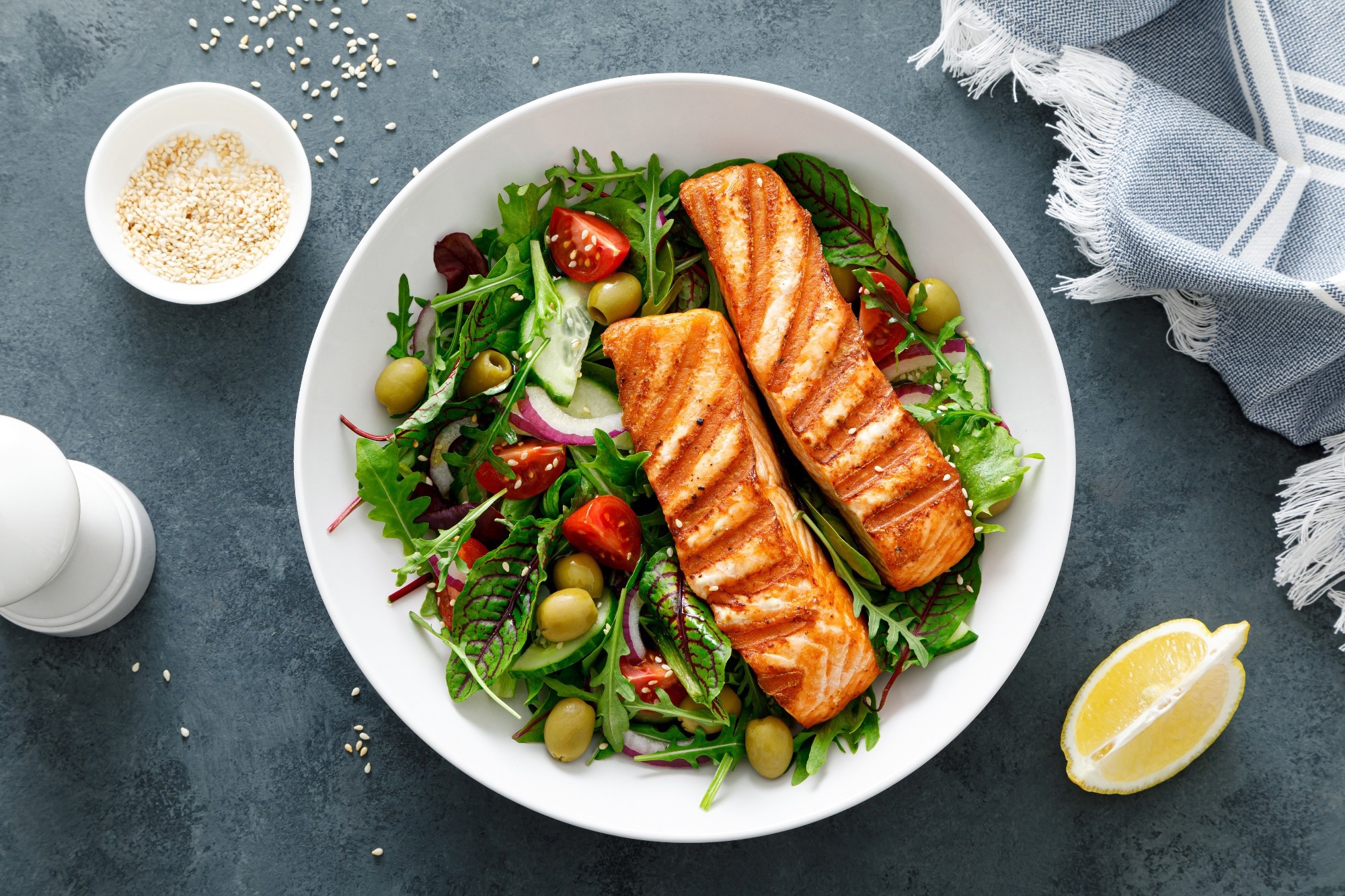
How can different diets combined with salt restriction alleviate high blood pressure and hypertension?
A recent Clinical Nutrition study conducted a clinical trial to compare the popular diets, namely, the Dietary Approaches to Stop Hypertension (DASH) and the Mediterranean diet (MedDiet), in combination with a salt-restricting strategy for reducing high blood pressure (BP) and hypertension.

Background
Ineffective BP control strategies are a prominent risk factor for premature mortality and morbidity worldwide. An uncontrolled BP increases the risk of complications suh as cardiovascular events and chronic kidney disease.
People with grade 1 hypertension and low-moderate cardiovascular disease are recommended to intake less salt and adopt non-pharmaceutical interventions to manage hypertension. Recent meta-analyses of randomized controlled trials (RCTs) have correlated salt intake with BP level. Low salt intake can improve BP levels.
Besides salt intake, both DASH and MedDiet are associated with effective BP reduction in adults with or without hypertension. Both the diet types recommended a high intake of plant-based foods and a low intake of red and processed meat.
Compared to the DASH diet, the MedDiet is high in total fat due to the inclusion of olive oil. Therefore, for patients with high BP, the DASH diet has proved to be more effective than the MedDiet.
Although the American College of Cardiology/American Heart Association (ACC/AHA) recommended the DASH diet as a heart-healthy diet in 2017, it was contradicted by the European Society of Cardiology/European Society of Hypertension (ESC/ESH) in 2018. The ESC/ESH recommended the MedDiet to be a healthy diet that can be easily practiced for a prolonged period.
The DASH diet with salt restriction exhibited a higher BP reduction. However, it must be noted that this combining strategy is not commonly practiced. To date, no studies have indicated the effectiveness of MedDiet with salt restriction. Furthermore, there is a need for a comparative study to assess the effectiveness of the DASH diet and MedDiet in lowering BP.
About the study
The current randomized, single-center, controlled, single-blinded study compared the effectiveness of the DASH diet and the MedDiet based on a three-month intervention period. A total of four parallel groups, i.e., control group (CG), salt restriction group (SRG), DASH diet combined with salt restriction group (DDG), and MedDiet combined with salt restriction group (MDG), were formed with a 1:1:1:1 allocation.
Participants (18 to 65 years of age) who visited the Hypertension Unit of the Hippokration General Hospital of Athens for the first time were selected for this study.
All participants had a high normal BP (systolic BP 130-139 mmHg and/or diastolic BP 85-89 mmHg), grade 1 hypertension (systolic BP 140-159 mmHg and/or diastolic BP 90-99 mmHg), or low-moderate cardiovascular disease risk.
However, none of them were under antihypertensive drug treatment or had a history of major medical conditions. At baseline, BP was measured, fasting blood samples were collected, and ambulatory blood pressure monitoring (ABPM) was performed.
Study findings
A total of 240 participants were randomly assigned to one of the four trial groups. The four study groups did not differ in terms of demographic and clinical characteristics at baseline.
Furthermore, at baseline, ~48% of the study cohort had high normal BP, and ~51% had grade 1 hypertension. The mean baseline BP (systolic/diastolic) was 137/88 mmHg, and the baseline 24-hour ambulatory BP (systolic/diastolic) was 133/83.
The primary assessment after three months of intervention revealed that, except for CG, all other intervention groups exhibited improvement in systolic and diastolic pressure. Compared to SRG, both the DDG and the MDG exhibited a greater reduction in systolic BP.
Furthermore, compared to the DDG, the MDG revealed a greater reduction of systolic BP values. All intervention groups exhibited a significant reduction in diastolic BP. Both the DDG and the MDG intervention exhibited similar 24-hour ambulatory systolic and diastolic BP values.
In comparison to CG, all other intervention groups indicated marginal odds of hypertension. Among interventions, the DDG and MDG exhibited lower odds of hypertension, with 65% and 84% odds, respectively, compared to the SRG.
In relation to the baseline levels, the greatest reduction in office systolic BP was found in MDG and diastolic was found in the DDG.
Conclusions
In sum, the MedDiet was found to be more effective in reducing office systolic BP compared to the DASH diet, while the DASH diet exhibited equal effectiveness for the reduction in office diastolic BP.
After three months of intervention, the DASH and the MedDiet exhibited similar 24-hour ambulatory systolic and diastolic BP values. Notably, dietary patterns combined with salt restriction exhibited the most effective result in BP improvement.
In the future, more studies are required to investigate the cardiovascular disease risk and other outcomes linked to MedDiet and the DASH diet combined with salt restriction. A longer clinical trial must be conducted to understand the effectiveness of each intervention better.
- Filippou, C. et al. (2023) DASH vs. Mediterranean diet on a salt restriction background in adults with high normal blood pressure or grade 1 hypertension: A randomized controlled trial. Clinical Nutrition. 42, pp. 1807-1816. doi: 10.1016/j.clnu.2023.08.01. https://www.clinicalnutritionjournal.com/article/S0261-5614(23)00269-8/fulltext
Posted in: Child Health News | Men's Health News | Medical Research News | Medical Condition News | Miscellaneous News | Women's Health News
Tags: Antihypertensive Drug, Blood, Blood Pressure, Cardiology, Cardiovascular Disease, Chronic, Chronic Kidney Disease, Clinical Trial, DASH Diet, Diet, Fasting, Heart, High Blood Pressure, Hospital, Kidney, Kidney Disease, Meat, Mortality, Nutrition, Olive Oil

Written by
Dr. Priyom Bose
Priyom holds a Ph.D. in Plant Biology and Biotechnology from the University of Madras, India. She is an active researcher and an experienced science writer. Priyom has also co-authored several original research articles that have been published in reputed peer-reviewed journals. She is also an avid reader and an amateur photographer.